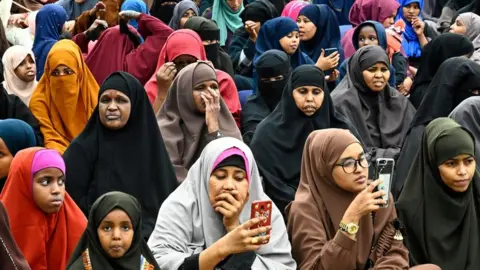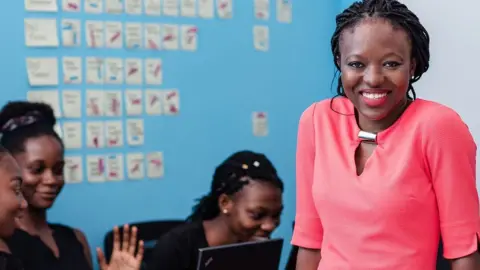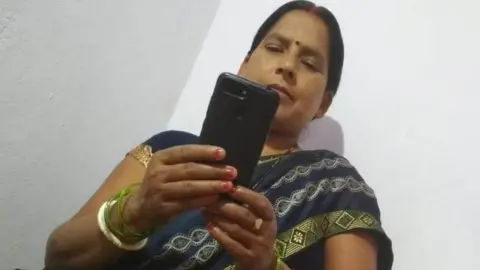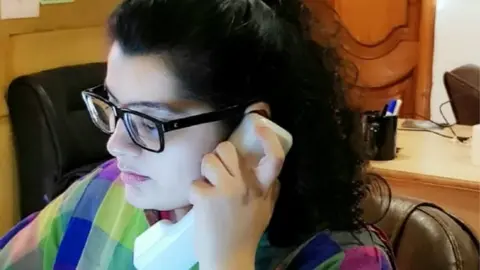The women fighting for digital equality
 Getty Images
Getty ImagesLockdowns have forced people to spend the past year and more learning, working, and socialising online - but in many countries, women have been missing out.
They are less likely than men to have access to the internet in nearly every region of the world, according to the latest figures from UN agency the International Telecommunication Union (ITU).
The so-called digital gender gap is most noticeable in Africa, where the ITU estimates that 37% of men have internet access but only 20% of women.
What is more, the divide appears actually to have widened in Africa since 2013.
 Regina Honu
Regina Honu"If you don't have digital skills, you're going to be left behind," says Regina Honu, founder of Soronko Academy, a tech school for women and girls in Ghana.
"Before Covid, if we put out an invitation for people to sign up, we would have 100 or 200 women," she says.
"After Covid, we had more than 2,000 women signing up.
"Covid has made people realise that if you don't have digital skills, you're going to be left behind."
Regina says many girls in Ghana might not even touch a computer until they go to school, or might have their internet access restricted by male family members.
And in the era of social distancing, connecting with people who are lacking the tech or the experience is difficult. Video calls are not possible for students without a computer or high-end smartphone, or for whom the cost of data is an issue.
Regina has instead found solutions that work for simpler phones.
"We used WhatsApp and Telegram. We made calls to check in and find out how they were doing," she explains.
But it has not been possible to reach everybody using such methods and she was pleased when lockdown easing meant they could "come back in person".
Gender-neutral
Lack of digital skills may deprive women of healthcare, education, work, and financial independence.
It is not easy to explain why the digital gender gap is wider in certain places than in others, says Boutheina Guermazi, director of digital development at the World Bank. But social, cultural, and financial factors all appear to be at work.
"I think it's linked to the broader gender divide", she says. "In regions where women do not have equal rights to own land, for example, or equal rights to the job market - when we add a digital dimension, the gap will clearly be deeper than in other regions, where those rights are equal."
And she says the Covid situation "hasn't been gender-neutral," making life even harder for some women.
 Nirmala Kumari
Nirmala KumariGlobally, women remain less likely than men to own a smartphone, according to mobile industry body the GSMA. But they are increasingly likely at least to be able to use one to access the internet.
This has been driven by positive change in South Asia, says the GSMA. But a gap does persist in the region: women are still estimated to be 36% less likely than men to have mobile internet access.
It was around 2018 that Nirmala Kumari used a simple mobile for the first time.
Today, she is a skilled user who is also helping other women in India to get connected, thanks to her work for a social-media network run by tech firm Gram Vaani.
Typically in her east Indian state of Bihar, if there is only one handset per household, men tend to get priority. As for the women, some of them do not even know how to charge the device.
But the pandemic has changed this, Nirmala told the BBC in an interview before India's devastating second wave of Covid infections.
"During the lockdown period, as the entire family used to stay in one place, the mobile phone was available at home," she said.
"So, at that time, women did get mobile access."
Her Mobile Vaani project gives women a voice on an audio-based media platform. Users dial in, listen to material on topics such as maternity advice, and can even record and contribute their own words to a conversation, as well. The service is designed to be informative and to boost women's confidence with using mobiles.
Coronavirus has made the platform even more useful for many people - but harder for Nirmala to promote than before. She switched to a remote-working method that relies on her calling influential women who operate within village community self-help groups.
"We told them to ask others to listen to [audio platform] Mamp, because it had important information, and because we needed their stories about coronavirus - good ones and bad ones," she says.
"The trick worked, and we got some very inspiring stories."
Abuse on rise
 Jannat Fazal
Jannat FazalGender-based violence during lockdowns has been described by the UN as a "shadow pandemic".
"If there's discrimination in the offline world, that is going to be projected on to our online spaces as well," says Jannat Fazal, who manages a cyber-harassment phone helpline in Pakistan. Spearheaded by the country's Digital Rights Foundation, it is the first of its kind in South Asia.
After Pakistan entered lockdown, the Lahore-based helpline logged a 500% increase in calls. Typical complaints included women being bullied or impersonated on social media, or being blackmailed when their personal information was shared without their consent.
Online spaces
In Pakistan's patriarchal society, these female victims may be blamed for supposedly "dishonouring" their families. In extreme cases, they may even be killed for it.
The helpline offers legal help, advice on digital security and psychological assistance for those in distress. During a peak earlier in the pandemic, Jannat's team found itself needing to offer round-the-clock support.
"Men tend to navigate online spaces without thinking something will happen", she says. "But women, on the other hand, have this constant fear.
"We need digital literacy and training so that women are more confident using social-media platforms and they're less vulnerable."
Ms Guermazi is hopeful that the issue of the digital gender gap is now more prominent in the minds of policymakers - including those in developed nations.
"I think what coronavirus did for the digital agenda was something unprecedented."
